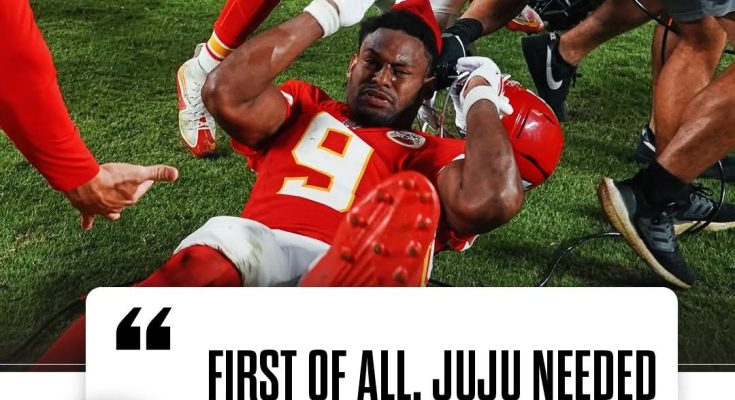The aftermath of Sunday night’s deeper-than-it-seemed dustup between Lions safety Brian Branch and Chiefs receiver JuJu Smith‑Schuster has grown a new wrinkle: Colts linebacker Zaire Franklin waded into the controversy, and things are getting spicy. According to comments Franklin made during a recent Club 520 podcast appearance, he labeled JuJu a “sneak disser” and endorsed Branch’s post-game retaliation as doing “the Lord’s work.” That framing transforms what many saw as a simple scuffle into a storyline of respect, retaliation, and trash talk across the league.
To understand why Franklin’s remarks are drawing attention, you’ve got to go back to what actually happened in Kansas City. As the game officially ended with a kneel-down, Brian Branch — who had ignored a handshake from Patrick Mahomes — turned and delivered an open‑handed strike to Smith‑Schuster’s face, sending him to the turf. What followed was pandemonium: JuJu leaped to his feet and pursued Branch; Branch grabbed his facemask and threw him down again; and both teams rushed in. (NFL.com) Smith‑Schuster emerged with a bloody nose. Branch later apologized, calling his actions “childish,” and sought to justify them by pointing to what he viewed as multiple uncalled fouls — including a block to his back by JuJu in the late stages of the game that went unflagged. (SI) Lions coach Dan Campbell publicly repudiated Branch’s actions, calling them “inexcusable” and apologizing to the Chiefs and Smith‑Schuster. (NFL.com) The NFL, unsurprisingly, suspended Branch for one game without pay. (The JuJu, for his part, maintained that he was simply doing his job and expected a handshake after the game. (SI)
Into this already volatile mix walks Zaire Franklin, who added his own fire. In the podcast segment, he doubled down on the idea that JuJu is some kind of sly provocateur (“sneak disser”) and characterized Branch’s response not only as justified, but righteous. While we don’t yet have a full transcript or video incrimination from the show itself, listeners online picked up on what he said, including the “Lord’s work” phrase, and shared it widely across social media. (Reddit)
By calling JuJu a “sneak disser,” Franklin is accusing him of subtle disrespect — not the overt trash talk you hear on mic, but the kind of under-the-surface disses that build resentment. That’s a different kind of insult, implying poor sportsmanship masked behind a smile. Franklin’s framing suggests he sees JuJu as someone who pushes boundaries with silent jabs rather than direct confrontation.
Then Franklin elevates Branch’s action — the punch and ensuing chaos — from mere retaliation to something almost moral. Saying Branch was doing “the Lord’s work” is a bold rhetorical move: it implies that this kind of enforcement or policing of respect is, in Franklin’s view, a higher duty. This is not a surprising posture in competitive locker-room culture, where standing up for one’s “own” can be valorized, but publicly aligning it with moral righteousness invites strong reaction.
Some will see Franklin’s words as honor among players: the idea that one must defend their name or territory. Others will see it as stirring the pot unnecessarily, especially since Branch already faces league discipline and criticism from his own coach. Franklin’s choice to publicly take sides — unapologetically — shifts the narrative and adds fuel to the fire.
Franklin’s comments also reflect something about JuJu’s reputation. JuJu is no stranger to polarizing takes. Some teammates and rival players have accused him of seeking extra motivation via gestures, celebrations, or comments. The “sneak dis” label fits into that narrative: that JuJu might provoke in ways not always obvious. So Franklin’s critique doesn’t exist in a vacuum — it leans on existing opinions and grievances. (NBC Sports)
Meanwhile, many in the NFL world will interpret Franklin’s remarks not just as commentary, but as a preemptive stake in the ground. He’s saying: “Here’s how I see it. Don’t get it twisted.” Especially since he’s a linebacker — a defender, enforcer role by nature — his voice carries weight when it comes to issues of physicality and respect on the field.
But this is a double-edged sword. Franklin’s bold alignments can draw backlash. Critics might say he’s glorifying violence, or oversimplifying the situation. Branch’s punch, after all, was a post-game act — outside the structure of a play — and therefore more vulnerable to condemnation for being uncontrolled. Dan Campbell already publicly called it unacceptable. (NFL.com) By backing Branch so staunchly, Franklin is wagering public goodwill on a fragile stance.
Also, there’s an element of strategy here. By planting his flag now, Franklin is giving himself mileage in discussions, media, and locker-room perception. When teams talk about protecting teammates, “standing up for yourself,” and so on, his comment becomes part of that lore. If JuJu or his team respond, Franklin now has a voice that’s already been heard — a measure of control over the narrative.
On the other hand, the league might not appreciate this kind of discourse. The NFL’s policy against post-game altercations is part of its efforts to maintain order, safety, and sportsmanship. Publicly endorsing a punch — even one already committed — pushes against the league’s messaging. It might make Franklin’s remarks a target in future disciplinary or image judgments.
It’s also worth noting that Franklin has never shied away from outspoken comments. In the past he’s talked smack (for example, earlier this year he called Steelers running back Najee Harris “soft”) and participated actively in media and podcasts. He’s shown a willingness to engage in narrative as well as physical play. In that sense, this episode is consistent. The difference now is that he’s stepping into someone else’s scuffle — siding openly and morally — instead of commenting on his own game.
As for JuJu, this is undoubtedly a moment of perception pressure. He already was in the crosshairs of established critics. Franklin’s barbs add weight to that. JuJu can respond publicly, he can lean on allies, or he can stay silent and let the storyline play out. Regardless, his image as a provocateur is being reinforced here. And for his defenders, Franklin’s framing will be considered an overshoot or unfair moralizing.
In the broader lens, this kind of public back-and-forth between players is part of the modern NFL ecosystem. Social media, podcasts, and accessible platforms mean that statements like Franklin’s don’t stay siloed in locker rooms — they reverberate instantly across fanbases, analysts, and opposition teams. A phrase like “Lord’s work” becomes a meme, a talking point, a clip that gets replayed. It shapes how fans, media, and other players see the incident.
It’s worth asking: would Franklin have made that remark if it weren’t being recorded, or playing to an audience? Probably not — the performance component is unavoidable. But that doesn’t mean his stance lacks sincerity. He likely believes what he’s saying, or at least believes in the posture he’s adopting. The question is how many will take it seriously, and how many will see it as self-promotion.
Long run, the flashpoint here is as much about respect and narrative as it is about the punch. Branch’s act already sits in a gray zone of motive, discipline, and accountability. Franklin’s commentary pushes one side — the side that says “retaliation is rightful authority” — and invites opposition from those who prioritize restraint, decorum, or de-escalation. All the while, JuJu is in the crossfire — his reputation, his responses, his future interactions with defenders will be seen through lenses tinted by these remarks.
If Sunday’s fight was physical, Sunday’s follow-up remarks are rhetorical warfare. Franklin picked his target intentionally. He framed the fight in moral terms. He indicted JuJu’s conduct and praised Branch’s enforcement. The public will now weigh those claims alongside what actually happened on the field, what the league decides, and what JuJu says in response.
So as this drama unfolds, keep an eye on a few things: will JuJu respond in kind? Will Branch or his camp publicly accept Franklin’s endorsement or reject it? Will Franklin double down? And importantly, will the league or clubs weigh this kind of talk in future disciplinary, public-relation, or trust assessments? Words, especially in the soundbite era, carry consequences. Franklin just tossed one into the pot, and the heat is rising.

